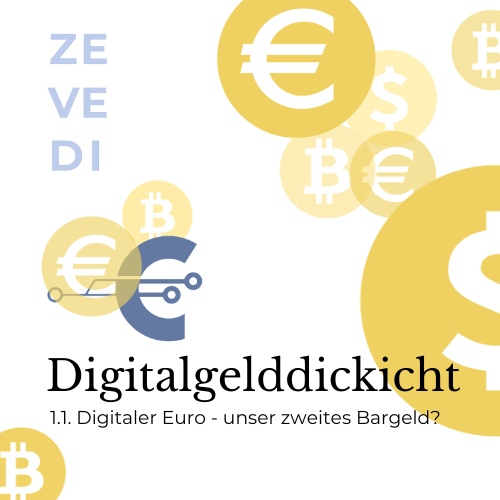
The following diagnosis is undisputed: in Germany, but especially in other European countries, the use of cash is declining. Cashless payment, on the other hand, is on the rise. Would a central bank digital currency, in our case the digital euro, be a good policy response in this situation? Only a few countries around the world have already introduced so-called “CBDCs” (central bank digital currency), but hardly any central bank is not discussing or planning it. The European Central Bank has been considering the introduction of a digital euro since Ovtober 2021, and the European Commission recently presented a legislative proposal to that effect. However, it is by no means generally accepted yet that the digital euro is needed at all.
In this episode, eFin & Democracy takes a closer look at the digital euro’s promise to be “digital cash”. We first clarify what cash is, what it can do, and how exactly its advantages could be replicated in a “digital” euro. In our everyday dealings, we are hardly aware of it: What distinguishes cash as public, state-guaranteed money in the first place, what are its qualities? Should the decline in cash use bother us? And what is driving the declining use of cash in the first place?
The podcast sets out to answer those questions, explains the role of commercial banks and payment service providers in analog and digital payments, and sheds light on the anonymity and participation that cash promises. The big question remains how such qualities can be translated into the digital space.
Guests
Claudio Zeitz-Brandmeyer is consultant on payments and digitization at the vzbv – Verbraucherzentrale Bundesverband» (Federation of German Consumer Organisations). He is a member of the Payment Systems Market Expert Group of the EU Commission and a representative in the Payment Transactions Forum of the Deutsche Bundesbank. Previously, he worked as a research assistant for members of the German parliament on financial policy and studied economics and public policy.
The Finance Team of the vzbv: https://www.vzbv.de/experten/finanzmarkt
Cederic Meier is a researcher at the Department of “State Theory, Political Science and Comparative Constitutional Law” at the Georg-August University of Göttingen and conducts in-depth research on constitutional and monetary law issues related to digitalization. Under the working title “Constitutional Issues of the Digital Euro” he is working on his PhD with Prof. Dr. Florian Meinel.
> See also his contribution on the eFin-Blog (German only): Quo vadis digitaler Euro?»
Jana Magin ist Ökonomin und promoviert an der Heinrich-Heine-Universität Düsseldorf am Lehrstuhl für Monetäre Ökonomik bei Prof. Dr. Ulrike Neyer» zur Geldpolitik der EZB und insbesondere den konkreten Auswirkungen, das die Einführung digitalen Zentralbankgeldes auf Privathaushalte hätte.
Further Information:
Video Recording of the Panel Discussion: The Digital Euro – Pro and Con» , 18. Juli 2022, closing event of the Citizen Lecture Series ” Do you understand Krypto” at the Technische Universität Darmstadt with
Katharina Paust-Bokrezion , Head of Payments Policy, Political Affairs, Deutsche Bank, and Marcus Härtel, Market Infrastructure Expert, European Central Bank.
Studies of the Deutsche Bundesbank (in English):
Deutsche Bundesbank, Monthly Report January 2023, pp.93-106: Access to Cash in Germany»
Deutsche Bundesbank, Monthly Report January 2023, pp. 75-91: Mobile Payment Usage in Germany»

